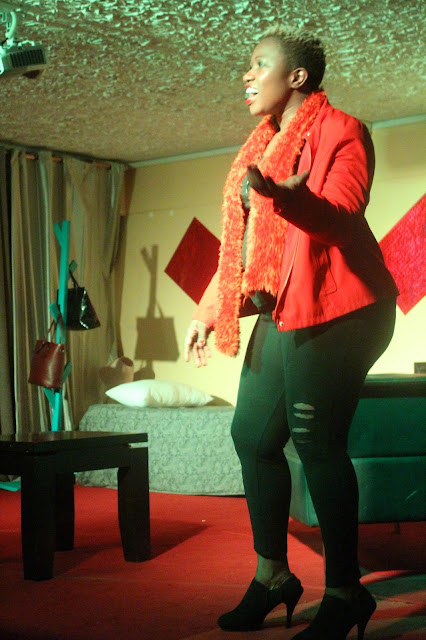ZIPPY
DESERVES A MEDAL FOR HER SOULFUL SCRIPT
BY
Margaretta wa Gacheru (posted 23 2018)
Zippy Okoth deserves a medal for her performance in ‘Stranger in my bed’ which she staged for a second time this past weekend at PAWA254.
She deserves
the medal first because she dared address a whole range of stigmas that women
the world over face related to marriage and divorce, the code of silence that
many women endure even when they’re horribly mistreated.
She deserves
it for the courage she displayed in taking on the stereotypical traps that women
fall into, revealing their folly for believing in foolish delusions like ‘mills
and bones’ styled ‘romantic love’ and fairy tale versions of ‘living happily
ever after.’
The first
time I saw Zippy perform her one-woman show (at Kenya National Theatre which
was too cavernous a context to reveal the nuances of this intimate story), I
didn’t see that she was intentionally over-dramatizing the love-struck little
Zippy who fell head over heels for her ‘Mr Right’, Ricky. I didn’t recognize
that the sappy star-struck love was meant to look rather foolish.
In fact, I
came late to last Saturday night’s show because I hate to see girls grow up
believing their lives are meant to be fulfilled by the perfect guy, or even the
not-so-perfect guy.
I arrived
after Zippy was pregnant and reflecting on what the perfect marriage was meant
to be, and how she actually knew early on that she wasn’t in one, but she was
going to hang on just the same. It would be her cross to bear, to “make the
marriage work.”
I gather
some women rebelled against Zippy telling the story of a divorced woman since
divorce in some religious circles is strictly taboo. It doesn’t matter if the
woman is beaten bloody, betrayed by a man who breaks his vows and robs the
woman at every level (emotionally, financially, socially and dignity-wise). The
woman is still meant to stay. She is also supposed to put on a happy front of
marital bliss even when her home is a battle ground and she’s the loser in all
ways.
Some women
didn’t like Zippy spilling the beans on married women whose life is hell, but
pretend it’s heaven. That too is taboo, the taboo of, as a wife, telling the
truth. And if a woman tells her truth, as Zippy has done, (with her director
telling us on Saturday night that the play is autobiographical, as if we didn’t
know), then she is meant to suffer all the more, this time with the stigma of
being a tell-all traitor to her fellow married women.
What was
really painful to watch in the play was when, after being beaten severally and
being accused by her cheating spouse of having
killed her own child through her ‘carelessness’, she continued to go
back to Ricky. It’s painful to watch, not just because zippy is a passionate
actress who performs from the heart. It’s painful because she mirrored the
experience of so many unhappy women who believe they are bound to live as
slaves and guilty parties.
Perhaps one
of the most stunning moments in the play, and one I apparently missed the first
time round is Zippy’s suicide attempt.
The fact
that she also addresses this other highly stigmatized experience, that of
attempted suicide (which I was recently reminded is a criminal offense that can
send someone to jail) is one more reflection of how much courage and conviction
the actress has.
In this instance,
Ricky saves her life, but only after kicking in the bathroom door, the one she
had locked in order to escape his brutal, life threatening beating.
It’s a
shocker to realize that a woman can feel she’s so trapped that she has no way
out other than taking her own life. But a myriad of women must feel a similar
sort of despair when they feel they’re not allowed to be free of a loveless
marriage.
Ricky saves
Zippy’s life not because he loves her, but because he feels he owns her (we
never heard if he paid the dowry). She’s his property just as the dead baby
was. It’s a hard reality that women may not wish to realize, but certainly,
watching ‘stranger in my bed’ must give a slew of married, or even single women
second thoughts about either getting married or staying married.
This must be
why Zippy’s play has generated a bit of controversy. Some women are said to
have boycotted the play because they didn’t want to hear from a woman
stigmatized by divorce. But what Zippy shows with her performance is that it’s
far better to live with that stigma than to remain a slave; better to be looked
down upon by some social circles for being so frank and honest about your life
experience in wedlock than to be dead.
Zippy’s
production proves that it’s better to be a survivor who can live to tell the
tale and get a medal (at least from me) for it than to live a lie and to not
practice the first code of conduct that every mother should teach her daughter
or son, which is to ‘be true to yourself.’ Or as William Shakespeare put it, “This
above all, to thine own self be true.”







No comments:
Post a Comment